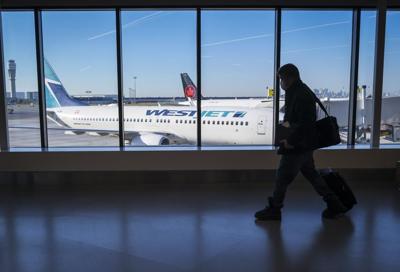If a good compromise is something that nobody’s happy with, the latest regulation aimed at protecting Canadian air travellers must be great.
As of Thursday, the Airline Passenger Protection Regulations (APPR) include a new section saying airlines must offer refunds for cancelled flights, even if the cancellation is outside the airline’s control. That refund obligation only kicks in if airlines don’t rebook a passenger on another flight leaving within 48 hours of the original schedule.
But passengers’ rights advocates, airlines, and industry analysts all slammed the tweak to the APPR, which was unveiled by the Canadian Transportation Agency in June. Among the complaints? The change could lead to higher travel costs and fewer routes; it’s nothing more than window-dressing from a government desperate to be seen as helping consumers amidst travel chaos; it’s actually making it harder for passengers to get refunds than it already was.
‚ÄúIt‚Äôs incredibly disappointing,‚ÄĚ said Gabor Lukacs, founder and president of Air Passenger Rights, a consumer advocacy group for airline passengers. Lukacs argued that passengers already had a right to refunds, even if it wasn‚Äôt enshrined in the APPR.
‚ÄúWhat the government is doing is regifting passengers a watered-down version of rights they already enjoy. This will make it more difficult for passengers to get refunds if they‚Äôre offered alternate transportation within 48 hours,‚ÄĚ Lukacs said. ‚ÄúThe airlines will try to argue that ‚Ķ if it‚Äôs Friday and they offer you a ticket for Sunday, then they can just keep your money if you choose not to fly.‚ÄĚ
In a press release, federal transport minister Omar Alghabra said the change to the APPR closes a ‚Äúgap‚ÄĚ in passenger rights which was revealed by the global COVID-19 pandemic.
‚ÄúOur government is working with air industry partners to help ease airport congestion to keep travellers moving, and we will continue to protect the interests of passengers when travel doesn‚Äôt go according to plan,‚ÄĚ Alghabra said.
Longtime air industry observer Fred Lazar, a professor at York University‚Äôs Schulich School of Business, called the change ‚Äúremarkably stupid,‚ÄĚ and predicted it will lead to higher prices for airplane tickets, and reduced options for people flying from smaller cities and towns.
‚ÄúThey‚Äôre not just going to eat the cost. They‚Äôll pass it on. They could do a deal with insurers and then build the cost of the premium into their ticket prices. And then come winter time, we‚Äôll start to see surcharges for certain destinations where weather is consistently an issue,‚ÄĚ said Lazar, adding that some airlines might decide certain routes are no longer worth the risk of having to issue a flight full of refunds.
‚ÄúPlanes are 90 per cent full these days. So good luck rebooking 200 or 300 people within 48 hours. Some routes just aren‚Äôt going to be worth the risk of having to pay out. And it‚Äôs going to be smaller cities that probably get their flights cut first,‚ÄĚ said Lazar.
The change to APPR, Lazar suggested, is more about political optics than anything else.
‚ÄúThis is nothing more than the government saying ‚Äėwe have to do something,‚Äô and then not actually thinking it through,‚ÄĚ Lazar said.
Airlines, meanwhile, say the change is unfair, that they’re being singled out as the cause of travel disruptions they don’t have any control over at all.
‚ÄúThere are a whole lot of disruptions that have nothing to do with the airlines, but it‚Äôs the airlines that are being told ‚Äėyou are the only ones responsible,‚Äô‚ÄĚ said an exasperated Jeff Morrison, president of the National Airlines Council of Canada (NACC), and industry association.
‚ÄúI think it‚Äôs government responding to public demands for something to be done and for someone to be held accountable. And so they did what they have always done, which is to essentially point the fingers at the airlines. And ‚Ķ that‚Äôs an overly-simplistic view of air travel,‚ÄĚ said Morrison.
WestJet spokesperson Andrew Gibbons said other organizations deserve to share in the blame for travel chaos.
‚ÄúWhile we accept our responsibilities to our guests and for commercial decisions we take, the traveller experience of the last few months has demonstrated that service failures are complicated, can be caused by many parties, and all providers of services to our guests should have the same scrutiny and responsibility under regulations that WestJet does,‚ÄĚ Gibbons said.
A spokesperson for Air Canada referred a request for comment to the NACC.



























To join the conversation set a first and last name in your user profile.
Sign in or register for free to join the Conversation